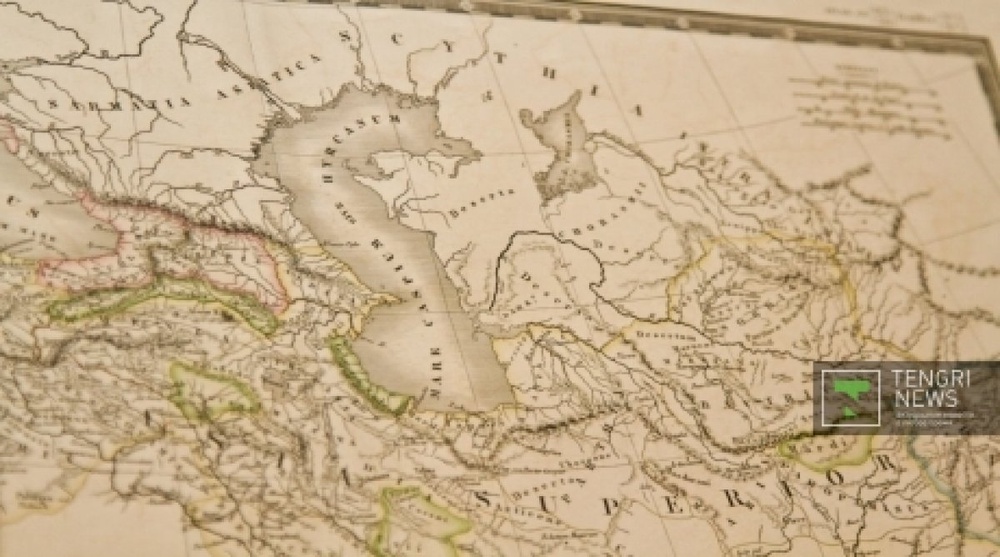
A British oilman has exhibited his collection of ancient geographic maps called Maps and Traveling: Introducing Kazakhstan to Europe, from Alexander the Great to Queen Victory in Astana, Tengrinews.kz reports. "Some of the maps still have the original Turkic names (though a bit distorted) of stows, towns, different landscapes that were renamed later or disappeared during historical cataclysms, like Mongol and Junggar invasions and especially during the period of Russian colonial sovereignty and the Soviet Union. They are very important for learning the historical geography and the history of our land," Director of a branch of Alkey Margulan Archaeology Institute Zainolla Samashev said. "I have always wanted to know how the first travelers from Western Europe came here (to the territory of Kazakhstan) and what their impressions were. Many such travelers not only drew the maps, but also wrote down their memories, their impressions and everything they saw here: people and ethnic groups they met here. This collection tells the history of how Western Europeans were getting to know these lands and people living here better and better," the owner of the unique collection, Nigel Gould-Davies, Ph.D. in Political Science, said at the opening of the exhibition. The exhibition contains 13 ancient maps that constitute a large part of the collection. According to Gould-Davies, he collected the maps in many cities of Western Europe, especially in Great Britain and Holland, as these countries gad big map-making centers in 16-17 centuries. Nigel Gould-Davies works in a major British oil company and has lived in Kazakhstan for the past 2 years. "Of course, I understood that I can not only work here, but also get to know the fascinating culture. One of the best ways to know the culture is to better understand the historic roots of this culture. This collection helps me better understand the people I meet every day," Gould-Davies added. The exhibition is held in Nazarbayev Center in Astana from June 12 to July 12. Admission to the exhibition is free of charge. By Shynar Ospanova





A British oilman has exhibited his collection of ancient geographic maps called Maps and Traveling: Introducing Kazakhstan to Europe, from Alexander the Great to Queen Victory in Astana, Tengrinews.kz reports.
"Some of the maps still have the original Turkic names (though a bit distorted) of stows, towns, different landscapes that were renamed later or disappeared during historical cataclysms, like Mongol and Junggar invasions and especially during the period of Russian colonial sovereignty and the Soviet Union. They are very important for learning the historical geography and the history of our land," Director of a branch of Alkey Margulan Archaeology Institute Zainolla Samashev said.
"I have always wanted to know how the first travelers from Western Europe came here (to the territory of Kazakhstan) and what their impressions were. Many such travelers not only drew the maps, but also wrote down their memories, their impressions and everything they saw here: people and ethnic groups they met here. This collection tells the history of how Western Europeans were getting to know these lands and people living here better and better," the owner of the unique collection, Nigel Gould-Davies, Ph.D. in Political Science, said at the opening of the exhibition.
The exhibition contains 13 ancient maps that constitute a large part of the collection. According to Gould-Davies, he collected the maps in many cities of Western Europe, especially in Great Britain and Holland, as these countries gad big map-making centers in 16-17 centuries.
Nigel Gould-Davies works in a major British oil company and has lived in Kazakhstan for the past 2 years. "Of course, I understood that I can not only work here, but also get to know the fascinating culture. One of the best ways to know the culture is to better understand the historic roots of this culture. This collection helps me better understand the people I meet every day," Gould-Davies added.
The exhibition is held in Nazarbayev Center in Astana from June 12 to July 12. Admission to the exhibition is free of charge.
By Shynar Ospanova


 +7 (777) 001 44 99
+7 (777) 001 44 99















































